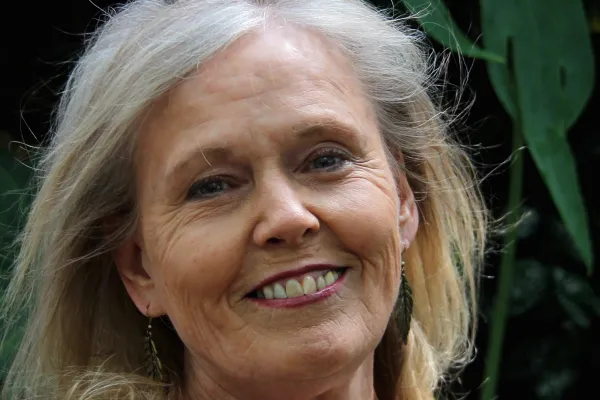Poetry Legends: Ellen Doré Watson Reflects on 20 Years of Poets on the Page and the Stage
Smith Arts

Published October 10, 2017
In September 1997, one of Ireland’s leading poets, Eavan Boland, stepped to the podium in Wright Auditorium and offered up her poems for the Smith College Poetry Center’s inaugural reading. The house was packed. By all accounts, the reading was a great success, and the audience seemed hungry for poetry.
In the 20 years since, Smith has celebrated poetry in its many quiet verses, as well as its noisy choruses and urgent questions. It is what Poetry Center director Ellen Doré Watson calls partaking of “the big banquet of what poetry is.” This fall, as she looks ahead to her final year as director, Watson relishes the profound culture of poetry that thrives at Smith. There is a certain poetic rhythm to her rich recollections.
Stage Fright
Pulitzer Prize–winner Mary Oliver was clearly nervous before she looked out from behind the stage curtains of John M. Greene Hall and saw that every seat in the auditorium was occupied. Watson says, “The tears came to her eyes.” Nonetheless, Oliver went out before the crowd “and gave an incredibly communicative, generous reading. I think in a small town like this, she just couldn’t imagine how 1,500 to 1,600 people would come to see her. That was a glorious, glorious thing.” Oliver read at Smith in 2000 and then again in 2009.
Poetry of Happiness
Ross Gay filled the Helen Hills Hills Chapel for his 2016 reading. Watson recalls: “This is a man who can write about Black Lives Matter in a way that just wrenches you with real surprise and meaning, but he writes mostly about joy and about his gratitude for everything there is to love in life, that gives joy. There aren’t too many poets like that. It’s much harder to write about happiness than grief. When we’re happy, we don’t need to process. He is phenomenal in that way—a really unique human being.”
Saving a Language
Some poets have causes that are as important to their poetry as their words. Such was the case with Native American poet Natalie Diaz, who gave a reading in 2015. “She grapples with the big issues on the reservation and talked to us about the Mojave language and how she’s trying to help save it. She directs a language revitalization program where she works with the last four fluent Mojave speakers.”
Enter Tiresias
Beat poet Lawrence Ferlinghetti, who read in 2001, was full of energy and surprise, even at the age of 82. Watson chaperoned him back stage, then introduced him to a packed house at John M. Greene. As she took her seat in the audience, little did she suspect that he had packed a costume that he would don before coming on stage. When Ferlinghetti edged his way through the stage curtains as a blind man would, he was wearing a mask and leaning heavily on a walking stick, tapping it across the wood floor. “And he told us he was Tiresias [the legendary blind Theban seer from Greek mythology]. And that was his grand entrance.”
The Poet from Baghdad
“Amal al-Jubouri is an Iraqi poet who I found because of someone I knew who was translating her work,” Watson says. The poet “was a tortured, difficult, amazing human being. She read in 2012 with her translator Rebecca Gayle Howell. Afterwards, the thing she wanted most was to go to the Emily Dickinson House in Amherst. So I took her. She bought an Emily Dickinson cloth doll there, and I said, ‘Is this for your daughter?’ And she answered, ‘No, no, no, this is for me.’”
A Poet’s Memory
Prolific American writer W.S. Merwin, who has read at Smith several times, has a light touch but great depth, says Watson. But before his 2013 reading at Smith, Watson learned that Merwin’s eyesight was failing so much that he could no longer read publicly from his work. Watson devised a plan. “We sat on stage side by side, and I just set out to ask him questions about poetry. It was then that I realized that he’s such a wonderful talker, I really didn’t have to say very much more. He would tell a little story and then he’d recite a poem from memory.” No one thought it odd that Merwin did not formally read. “People just thought it was a unique format for a reading.”
When Poetry Meets Music
Sometimes, mid-reading, poets break into song or musical accompaniment, as American poet and essayist Gerald Stern did. Watson notes, “He does that if you’re having lunch with him or anywhere else. He did indeed sing at both of his readings here. He knows all these old, old songs, and he’ll start singing them in a terrible voice but with great joy.” Other poets embraced the same fondness for musical surprise. American poet and musician Joy Harjo played her saxophone; the former U.S. poet laureate Juan Felipe Herrera suddenly added a harmonica riff to the sprawling lines of a poem he was reading.
A Passion for Poetry
Watson, a poet herself, has come to know revealing details about the poets who have visited Smith in the past two decades Her stories bring the writers into sharper focus, no matter what mystery surrounds the enduring eloquence of their art. All in all, Watson says, poetry comes at us in two seemingly contradictory ways. “One is where we feel a chime go off, someone has expressed just what we needed to hear, that which we’ve experienced as well.” In the other, she explains, “The poet is letting us into a new place where we don’t have any idea about what that life, or place, or feeling or culture is. Yet we find empathy, we find illumination.”
Learn more about the history of the Poetry Center at Smith College.